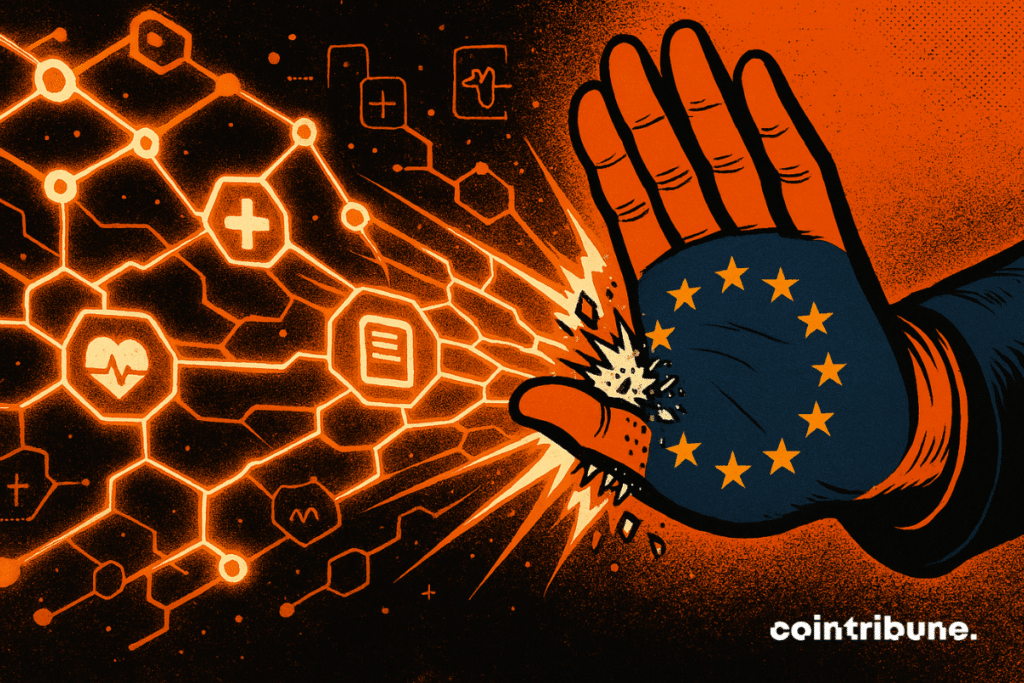14h05 ▪
4
min read ▪ by
Europe is faltering. Where Asia is experimenting and the United States is investing heavily, the Old Continent hesitates. Blockchain, despite its immense potential for the healthcare sector, is progressing in Europe like a snail on a highway. This slowness raises an uncomfortable question: is technological disruption really perceived as a priority by European leaders?


In brief
- Other countries innovate, the EU multiplies regulations.
- Europe remains a fragmented technological patchwork.
- Blockchain in the healthcare sector suffers from conflations with cryptocurrencies.
A Paralyzing Regulation Despite Good Intentions
European regulation, designed to clarify, ends up discouraging. The MiCA regulation aimed to harmonize the market, but it frightens small players. The burden of administrative requirements kills many initiatives in their infancy. “Startups, in particular, do not want to fight in the legal jungle,” notes Volker Nürnberg, a professor at Munich Technical University.
In Germany, the situation is caricatured. Award-winning projects like electronic prescriptions have never been deployed. And the GDPR, although based on laudable principles, becomes yet another barrier. Blockchain operates on transparency, whereas regulation demands erasure. For Lukas Weidener, this contradiction is heavy:
These regulations may cause Germany to lose its place in the global development of technology.
We hope this strictness will become a competitive advantage. But to date, it mainly acts as a brake.
A Fractured Europe, a Fragmented Market
Within Europe’s borders, strategies diverge. Estonia is digitizing its state with blockchain, Germany is experimenting with digital identity, Switzerland is attracting crypto unicorns. But this technological patchwork harms coherence.
Result: systems incapable of communicating with each other. “Fragmentation complicates pan-European projects,” Nürnberg laments again.
Healthcare, on its side, remains a highly regulated field, not prone to boldness. Yet blockchain could transform daily life there: secure data sharing, integrity of clinical trials, drug traceability.
Without a common framework, these promises remain empty words. Worse: each country imposes its own standards, making cross-border projects nearly impossible. A technology meant to connect data is, in Europe, hindered by administrative borders.
Blockchain: A Tarnished Image, a Misunderstood Potential
Blockchain suffers from a notorious reputation. Too often confused with crypto speculation, it inspires more mistrust than enthusiasm. “Some officials still see blockchain as a digital casino,” an expert remarks ironically.
However, in the healthcare sector, use cases are solid. Immutable patient records, secure teleconsultations, automated reimbursements via smart contracts… The ground is fertile. But gardeners are missing. Fear of the unknown, reinforced by crypto scandals, blocks institutional curiosity. Even the potential environmental benefits of some blockchains fail to convince.
Weidener puts it plainly:
The perceived energy consumption of blockchains deters decision-makers, especially where sustainability is a priority.
The conflation is unfair but real. And as long as innovation is seen as a risk rather than an opportunity, it will not find fertile ground.
It is no coincidence that South Korea and the United States are pulling ahead. There, they finance, test, and adjust. In Europe, they regulate. Many observers agree: the EU presents the image of a bureaucratic continent, quick to regulate but slow to innovate. Talents leave, projects migrate, standards are set elsewhere. And Europe, it comments. If it wants to have weight tomorrow, it will have to dare today. Without this, blockchain in healthcare will be just one more missed appointment.
Maximize your Cointribune experience with our “Read to Earn” program! For every article you read, earn points and access exclusive rewards. Sign up now and start earning benefits.
La révolution blockchain et crypto est en marche ! Et le jour où les impacts se feront ressentir sur l’économie la plus vulnérable de ce Monde, contre toute espérance, je dirai que j’y étais pour quelque chose
DISCLAIMER
The views, thoughts, and opinions expressed in this article belong solely to the author, and should not be taken as investment advice. Do your own research before taking any investment decisions.

